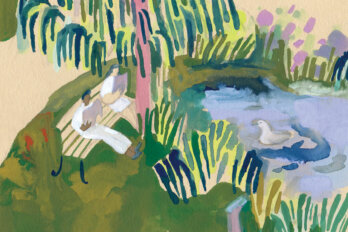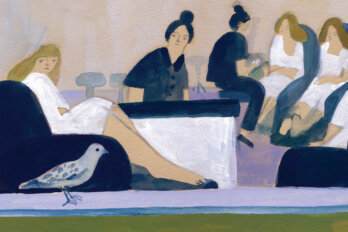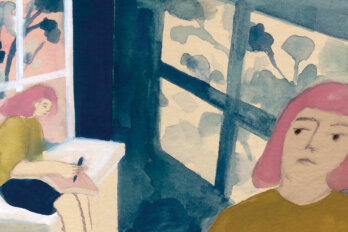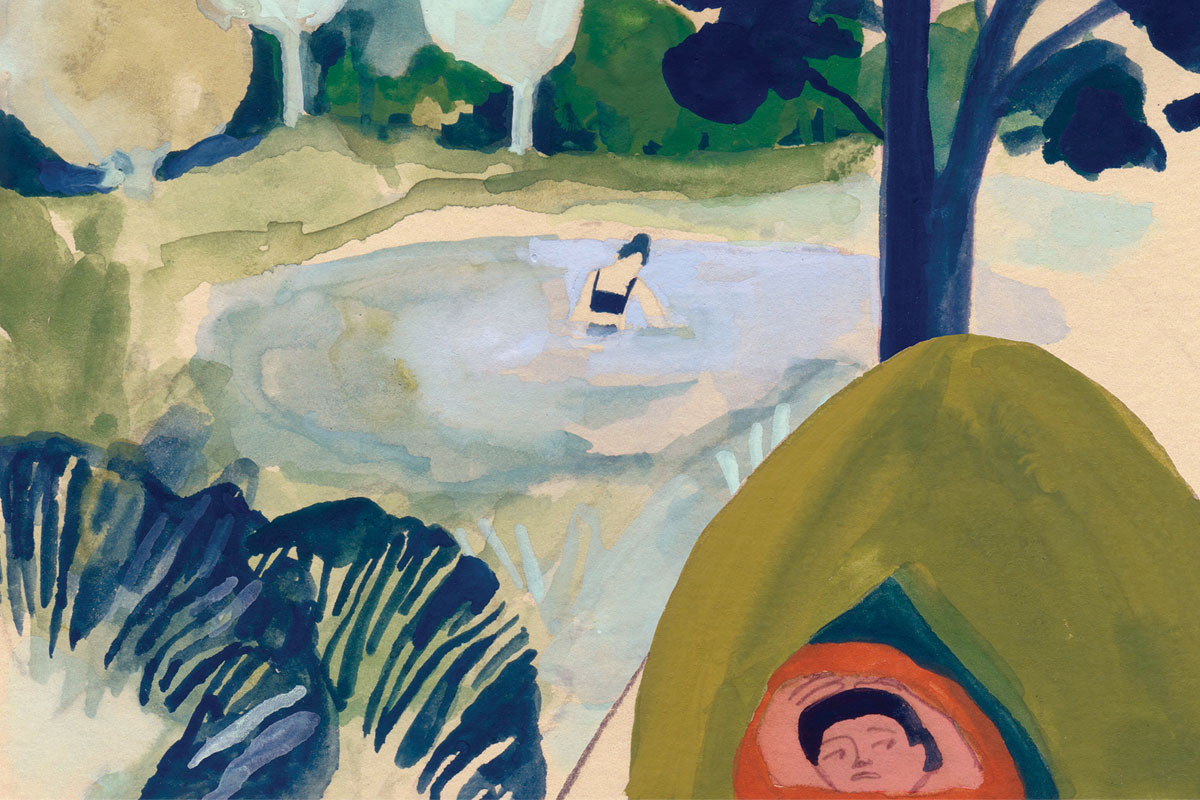
FICTION / JULY/AUGUST 2024
Heaven on Earth
BY DIMITRI NASRALLAH
ILLUSTRATIONS BY JULIA GR
Published 6:30, Jul. 26, 2024
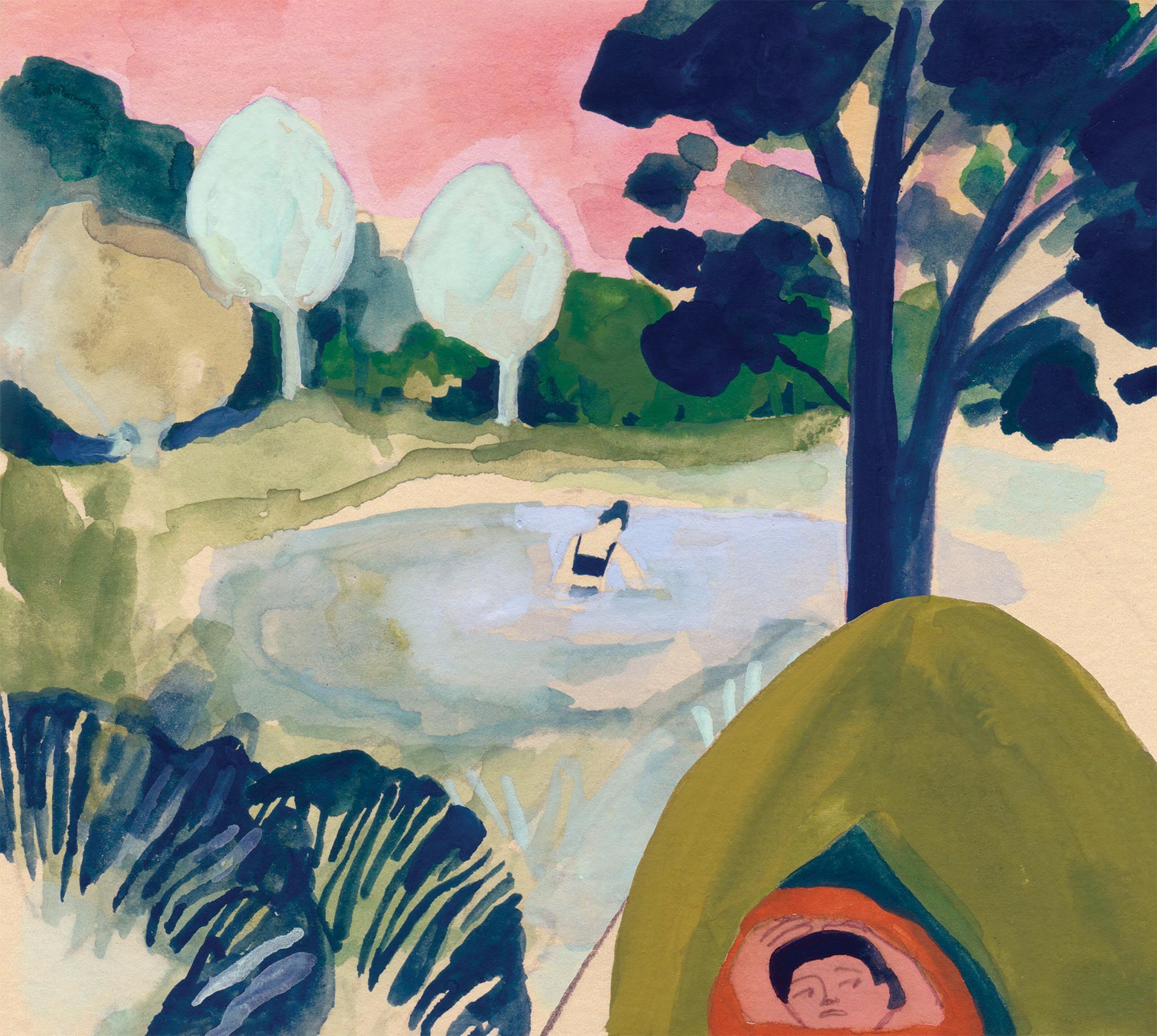
Though that day had started off warm and sunny, by afternoon clouds gathered. Adnan and Ginny parked her beat-up hatchback in a gravel lot on the outskirts of the village and followed a trail into the hills, a provincial parks map in hand. They spent the first night at a campsite a ten-minute walk from the parking lot, where some other campers had set up as well.
Around a communal bonfire, a camp worker who rented out bikes and other supplies drew their attention to a featureless solid-green part of the map where, he said, an unmarked path led down into virgin forest.
“It’s here,” he said, marking an x. “Look for an inuksuk on the right side of the trail here. Follow that some 2k in, you’ll get down to a river in the valley.”
He drew in the winding river, which was also not on the map.
“Some of the most majestic views you’ll ever hope to see, like a heaven on earth. It’s not on the map so it stays that way.”
“Are you going there?” Ginny asked. “Can you guide us?”
“I’m not supposed to tell anyone about it, so no can do,” he said. “Also, a French couple went in and got lost earlier this season. They didn’t really know what they were doing.” He shook his head as if still pained by the thought.
Adnan saw Ginny’s eyes light up. This trip hadn’t been his idea. They were camping only because she’d pushed him to do something outside his comfort zone. She’d gone on camping trips with her family as a child, and those counted among the happiest times of her life. They’d caught their own fish, hiked barely-there trails, and filtered their own water. Roughing it on unmarked land was exactly what she was looking for. He had never gone camping before. Where he was from, carrying your belongings on your back was not a pleasure to be indulged.
That night, in their tent, Ginny said, “I want to see that while we’re here, that unmarked part.”
“Didn’t he say some people went missing?”
“He said they got lost. People get lost all the time. And he said they were inexperienced. I’m not. What’s the point of coming this close to a heaven on earth and never seeing it?”
Adnan lay uncomfortably on his back, his face bathed in a rectangle of light as he waited for a page to refresh on the screen. Ginny sorted through a cosmetics case, a flashlight between her ear and shoulder.
“When I was a boy,” he said finally, “my father told me once that heaven is something that comes to you; you can’t go looking for it. Besides, I’m pretty sure the camp guy was stoned.”
“Where’s the adventure in spending four nights on this parking lot campground in our little spot, listening to other people’s kids cry as we fuck quietly in our sleeping bags and strangers wander the trees behind us to pee? We’re already here. Why not go just that little bit further?”
Ginny kissed Adnan’s neck.
“Just come with me,” she whispered.
He felt her electricity. He knew he had lost.
In the morning, Adnan and Ginny packed up and began hiking along the path into the mountains, in search of the inuksuk.
“It feels so strange to go looking for one of these,” she said.
“Why’s that?”
“I’ve looked for inuksuks all my life, ever since I started camping with my parents. My dad showed me how to build one, I’ve built a few myself. But I look at them now, after everything that’s been said about colonialism, and all I see is an appropriation. I used to love looking for inuksuks, but now I just feel guilty that we used them so that my camping trips can become more convenient. At the same time, my guilt deepens my love for them.”
At a wide tree trunk whose growth had been felled long ago, their gravel path came to an end, giving way to dirt.
“You’re really conflicted,” he said.
“You aren’t?”
“I don’t have any attachments to inuksuks,” he said. “I’ve never built one, nor has anyone in my family. No one in my family ever liked camping. They see living outdoors as wasteful. One of the most frightening nights of my childhood was in a tent, waiting for a boat to arrive as we escaped the war. I just remember listening to the night and thinking it would never end.”
“We never had problems like that,” Ginny said as she walked in front of him. The sunshine coming through the leaves rippled across her hair. “But I wouldn’t have minded them sometimes. My life was pretty boring actually. When I was younger, I’d go out of my way to find trouble. The things I did, that I’ve let people do to me. But now I think I was just slumming it to figure myself out.”
Not used to hiking with supplies on his back, Adnan struggled to keep up. “Trouble helps us sort out who we are,” he said, panting a little.
“It was like I just wanted to shock my system to figure out what was underneath it all. To find out who I really am.”
“What if you go through all that trouble and find out there’s no one down there?”
“Do you think I’m shallow, Adnanny?” Ginny smirked.
“Of course not,” he smirked back. “Anyways, I haven’t known you long enough to really decide one way or the other.”
They laughed, for different reasons. This camping trip was the first time they’d ever made a plan to go anywhere together besides a bar or her bedroom. Ginny was twenty-six, Adnan forty-two. They had been seeing each other casually for the past three months, maybe seven or eight times in all. In that time, she’d developed a habit of bringing up their age difference with that nickname whenever she felt she’d revealed too much in front of him. He enjoyed her intellectual curiosity, how they conversed for long hours together, how her thoughts wandered as she tried on larger connections to the world at every turn. Beyond that, they texted.
“There it is,” Ginny said.
“There’s what?” Adnan said.
“The inuksuk.”
It stood about knee high on the right side of the path, signalling a narrow clearing that led down a slope into the valley below.
“So that’s what they look like,” he said. “I’ve never seen one before.”
“It’s a signpost and a balancing act,” she said.
The inuksuk was built of nine rocks in all, with thicker slabs near the bottom and the longest one saved for the middle to give the impression of arms extending out. It had been there long enough for moss to gather along its side.
They began to edge their way down, climbing down a ledge and settling onto a winding, broken trail. Soon the main path was above their heads, then it was obscured by the treeline, then it disappeared.
The sounds of the forest changed. Leaves rustled and birds chattered. They heard small animals scurry around their feet, though they never saw them. Half an hour later, they began to hear rushing water. Soon they arrived at a wide, lazy river. They set down their backpacks and took off their shoes. The water felt warm in August.
“Have you ever swum in a river?” Ginny asked.
“I’m not a very good swimmer.”
“The trick is to swim into the current.”
“It looks like it’s moving pretty slow.”
“It’s much stronger than it looks. We’re nowhere near as strong. We think too much. It just is.” She pulled off her shorts and shirt and waded in. “Don’t overthink it. Just come in with me.”
She reached out her hand. Reluctantly, he waded into the current until he was waist deep, feeling his way along the rocks that threatened to trip him at every step.
“In a river like this, with no one else around,” she said, “it’s easy to feel like we’re the centre of the world.” She fell back into the water and let herself float.
It was true, he thought, there was something magical about being in a secluded valley, trees and rock rising up on either side, waist deep in a current of water as the bright blue sky framed his own personal amphitheatre. This was that elusive world where privacy was all there ever was and clothes never mattered.
“I could stay here forever,” Ginny said, drifting along the hazy surface.
Adnan closed his eyes and let thoughts drain out of his head as the sun beat down on his face. He wondered when he’d last felt so at one with the outside world. He never felt that way when he was on his meds. He was glad he’d decided to take a break from them. Maybe his weakness was other people and all their complications. He saw his thoughts leaving him behind and filling in every crevice of the valley instead.
When he opened his eyes again, he spotted another man and woman on the trail going down to the bend in the river.
“It’s gorgeous!” the woman said.
“Like nothing else,” the man responded.
They locked arms and posed for a selfie.
The awe Adnan had experienced just seconds ago dissipated. Back on shore, he and Ginny got dressed, gathered their things, and left.
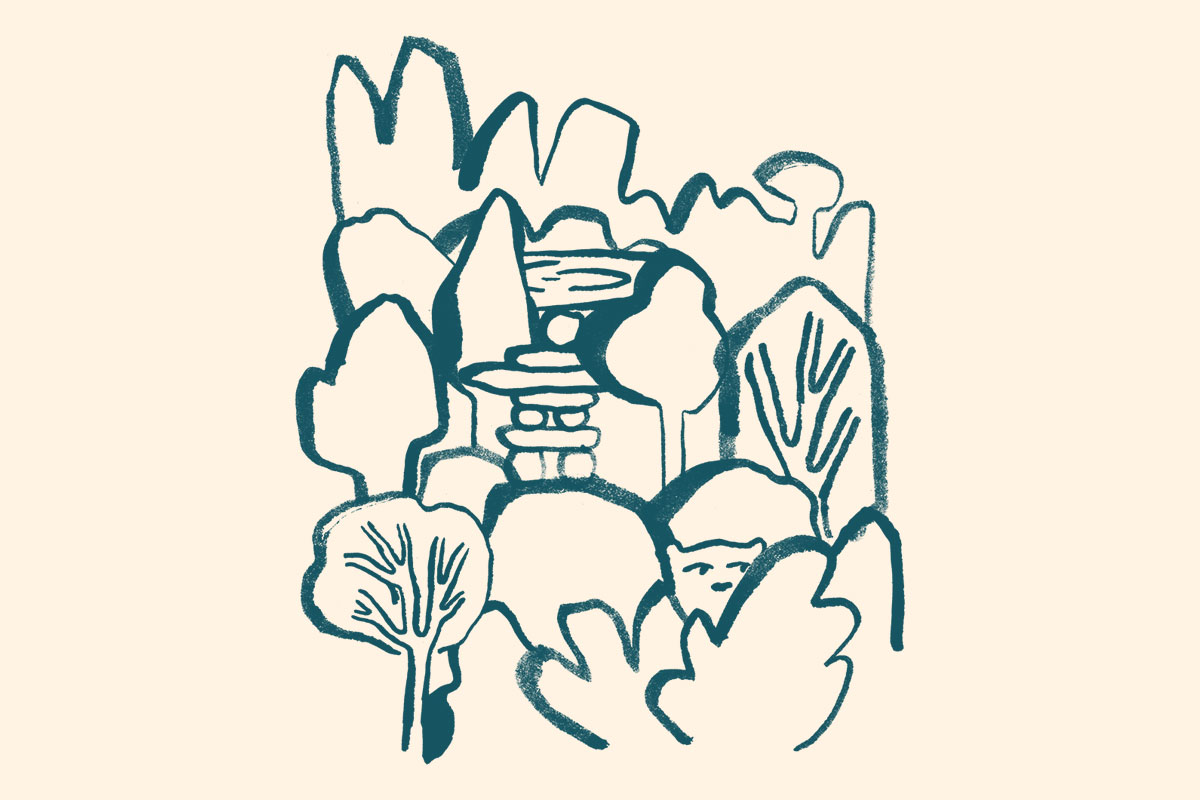
Adnan and Ginny followed the river deeper into the forest as it wound through the mountains. They occasionally passed hikers along the way, but by the time they stopped for the day, they hadn’t seen anyone else in almost two hours. They were at a bend downstream from some rapids, where the current slowed and pooled by a thicket of evergreens. From their vantage point, the sun would set in a few hours in the lowest dip of the valley between mountains.
“Stunning,” Ginny gasped. “I wonder if that French couple who got lost were able to see this.”
“If it’s not heaven yet, we’re getting quite close,” Adnan said, slapping a mosquito on his neck. “It’s pretty nice.”
“It’s not really like you to want to be overwhelmed by anything, is it?”
“That’s true,” he conceded. “I don’t trust any feeling that can take hold of me.”
“You’re one of those hamsters who won’t leave the cage even though the gate is open.” She laughed and poked him in the side to let him know she was not serious.
“I guess I am,” he agreed but tempered his laughter because maybe she really did mean something by it.
Setting up camp, they pitched the tent, lay down the sleeping bags, and collected broken branches to get a fire going.
“I’m tired of sandwiches,” he said.
“Have you ever caught a fish?” she said.
“No,” he said, feeling a little inadequate.
“I’ll teach you. This is a perfect spot, in this pool here. I bet we have all the fish we need.”
Ginny found some fishing line in her backpack, hooked and baited it with a grasshopper she trapped along the rocks, and then tied and wrapped it around a soup can before placing it in Adnan’s hand. “Come on,” she smiled. “I’m not catching your dinner for you.”
They waded into the pool.
“Stand still,” she said.
They didn’t move, and soon the mud around their feet settled down and the ripples from their entry disappeared.
“Concentrate,” she said.
She steadied his hand as he dangled the hook silently above the water’s silvery surface. A small fish swam past their legs. Adnan’s urge was to flinch away, but Ginny felt it coming on and shushed him. She lowered his hand and made the hook dance along the pool’s surface. The flirtation caught the small fish’s attention, and it circled up to see what was on offer. All the while, the lure kept teasing it gently.
As he watched intently, Adnan felt manipulated as well. Ever since the app’s algorithm had matched their profiles, the differences between their worlds had begun begging questions of his assumptions. What exactly did she see in him, he often wondered. He guessed she saw him as stable, calm. They had very different life paths. Surely people would judge him, if anyone knew. Such lines are so clearly defined these days. The sun skipped across the tiny ripples caused by the dancing lure, and the fish felt curiosity toward the obvious temptation that called its attention at the surface—and also trepidation at what lay beneath the trick.
“See how it’s paying attention,” Ginny whispered, edging closer. “You just flick your wrist and it twitches. It really wants what we have. We just have to tease it enough until it overcomes its hesitations and can’t think of any other way. Look at it. It just has to have that bait, no matter what. All you have to do is dangle it there long enough, twitching, dancing, making sure we don’t lose its gaze and . . .”
The fish snapped.
She yanked his arm up with a quick, violent jerk.
It thrashed around in the open air between them, helplessly hooked, humiliated.
“See how that works?” She smiled with satisfaction. “The world is bountiful and generous.”
“If you’re the fish,” he said, “the world is dangerous and deceitful.”
“A couple more like that and we’ll be fed.”
At dusk, they cooked two rainbow trout. As the last light faded, the air filled with the rich smells of grilled fish over an open fire.
“This is delicious,” Adnan said.
“The only way to eat,” Ginny replied.
“It does taste a little like heaven.” He felt it in his stomach now.
It had been six hours since they last saw or heard another person. They were alone, and their lives back in the city, incompatible as they were, had begun to recede. Soon all was dark, and the entire landscape was lit only by the dim glow of their campfire. There was the call of distant loons. As their fire burned down, darkness draped over the valley like a blanket. Then the stars lit up a tapestry above, and a full moon rose above the trees. Crickets chirped. All was perfectly still.
“It’s like we don’t exist,” Adnan said, snuggling in close to Ginny.
“Just goes to show that nothing really matters,” she said, leaning in to accept his kiss.
They fondled each other gently at the fire’s side, and feeling connected in that moment, they came together. Afterward, they doused the embers of the fire and zipped themselves up in the tent.
Sometime later in the night, they were awakened by a loud, persistent clanging.
“It sounds close,” he whispered. “What is that?”
“I think it’s the skillet,” she said. “Did we forget to wash it?”
“I don’t know,” he said. “I guess we forgot.”
They heard a sniffle and then a growl as the skillet was pawed around the rocks and a bag torn open.
“It sounds big.” He tensed up. “It sounds like it’s right here.”
A body brushed up against the side of the tent. They both gasped.
“Don’t make a sound,” she hissed.
He gripped her as if she were a shield.
The sound receded. They heard nothing more.
“I think it’s gone,” she said.
“I don’t think it’ll ever leave,” he said. “It lives here.”
“It was probably just a raccoon. The sound is always bigger than the animal that makes it.”
She fell back asleep. He could not.
As he lay awake, his mind raced. That was no raccoon. They both knew it sounded bigger than that. He’d felt her arms tighten around him as it passed. It had brushed against their tent! He could still hear its coarse fur against the plastic. The sound played over and over in his head. Why would she lie to him when it was so obviously not a raccoon?
Paralyzed in the dark, Adnan decided that Ginny would protect the bear out of the same guilt she used to project her conflicted outlook about everything. But it was he who needed protecting! He was the one who was frightened and out of his element. The bear had lived here all its life, was part of a lineage of bears, had been born into so many generations of bears. He could never outthink the bear on this unknown earth, in its haven.
The wilderness creaked and croaked and scraped and chirped and cawed all around him, and Adnan silently began to crumble, his arms locked, his eyes frozen in terror at the sheer futility of the plastic bag that was the only thing keeping the world at bay. It flapped and shuddered with the slightest gust. He looked over at Ginny as she slept and could see only the lie. A raccoon.
It took forever, but the suffocating fabric of their tent finally began to go grey. Adnan’s muscles, rippled with the tension of fighting against a hook caught in his mind for so long, finally let go. Exhausted by the night’s paranoia, he let himself be yanked up into the deepest of sleeps.
When Adnan woke again, it was because of the heat. The sun had risen and conspired to cook him in his own sweat. His sleeping bag was drenched. Ginny was not at his side. He pulled at the bag until he found the uncooperative zipper. When he finally broke through, he gasped for all the air that had eluded him since the overnight encounter.
Ginny was in the lake, floating. “It’s so refreshing,” she called. “Come in!”
He ignored her, searching instead for the trail of destruction left by the bear.
“Our food?” he called hoarsely.
“What?’”
“It tore apart our bags. Where’s our food?”
“Oh, I cleaned it up earlier. Something got into the garbage. Our food is fine,” she said, coming out of the water. “You okay?”
His eyes scanned her wildly. “Did it shit anywhere? Mark its territory?”
“What?” He saw her recoil a little and could understand why, even though he felt powerless to stop himself.
“We have to mark our territory,” he heard himself say. “Let it know to leave us alone.”
She looked at him incredulously as he smelled around the perimeter of their camp. Leaning back against a fir tree, he pulled down his pants and shat with urgency and conviction. Splashes burned Adnan’s ankles as Ginny covered her nose with a gasp. Beyond them, the morning sun melted away the night haze from the lake’s cool surface.
Adnan breathed deeply, both in relief and regret as he watched Ginny absorb him in this humiliating pose. He was aware that he’d lost control of himself again, that the bear, even if it hadn’t been one, had tripped a wire in his thoughts and set him loose. He could see clearly that he’d scared her, that he was scaring himself. But that concern sounded like a distant nag compared to the rampant fear he’d endured overnight.
He slowly made his way back to where she stood, his arm outstretched as if to say don’t worry. Once he was close enough, he confessed, “I’m not well. I’m afraid for me, for you too. I need your help to get me out of here.”
“What can I do?” she said. “Tell me.”
He pulled his phone out of his pocket. “I need you to call my wife and get her to come pick me up as soon as possible.”
“You’re married?” Ginny said. “I don’t understand.”
“Call her, please.” Adnan pulled up the number and set the phone at her feet. “She’s the only one who’ll know what to do.”
Seeing no other option available to him, he crumpled into a ball on the ground. Sand sticking to his face, he looked up and watched Ginny take a moment to study Layla’s picture on the screen, which was labelled “HOME”: her jet-black hair, the uncommon warmth of her smile in that picture, her cluelessness as to who would be behind the call.
“I don’t think we’ll get signal out here,” she said.
“Please . . . try.”
He saw Ginny think hard about what she was being compelled to do, and realizing how it stacked up against her, how it made her look to all involved, she wiped a tear from her eye. He imagined her, not twenty minutes earlier, floating in the pristine waters of the lake, the warm morning sun embracing her goosebumped skin, breathing just enough to keep herself afloat. He imagined her smiling, eyes closed, in the tent the night before.
He imagined her sitting across from him, coffee in hand, trying to impress him with the details of her life, expectant in his attention. He had been happy to let her distract his otherwise predictable thoughts as their conversation wandered from summaries of professions to comic impressions of passersby on the street. He imagined that holding her hand and pulling her toward him could be a cure, or at least an escape. He imagined all this was over now, that it was always going to end in disaster.
He watched Ginny raise the phone to the sky in search of service and then waited for Layla’s familiar voice.
